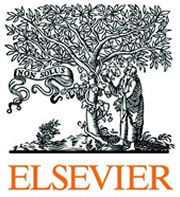Available online 16 February 2015
Abstract
 Δ9-tetrahydrocannabinol (THC) and cannabidiol (CBD) are the major constituents of the Cannabis sativa plant, which is frequently consumed by subjects exposed to life-threatening situations to relief their symptomatology. It is still unknown, however, whether THC could also affect the maintenance of an aversive memory formed at that time when taken separately and/or in conjunction with CBD. The present study sought to investigate this matter at a preclinical level. We report that THC (0.3–10 mg/kg, i.p.) was able to disrupt the reconsolidation of a contextual fear memory, resulting in reduced conditioned freezing expression for over 22 days. This effect was dependent on activation of cannabinoid type-1 receptors located in prelimbic subregion of the medial prefrontal cortex and on memory retrieval/reactivation. Since CBD may counteract the negative psychotropic effects induced by THC and has been shown to be a reconsolidation blocker, we then investigated and demonstrated that associating sub-effective doses of these two compounds was equally effective in attenuating fear memory maintenance in an additive fashion and in a dose ratio of 10 to 1, which contrasts with that commonly found in C. sativa recreational samples. Of note, neither THC alone nor CBD plus THC interfered with anxiety-related behaviors and locomotor activity, as assessed in the elevated plus-maze test, at a time point coinciding with that used to evaluate their effects on memory reconsolidation. Altogether, present findings suggest a potential therapeutic value of using THC and/or CBD to mitigate a dysfunctional aversive memory through reconsolidation disruption in post-traumatic stress disorder patients.
Δ9-tetrahydrocannabinol (THC) and cannabidiol (CBD) are the major constituents of the Cannabis sativa plant, which is frequently consumed by subjects exposed to life-threatening situations to relief their symptomatology. It is still unknown, however, whether THC could also affect the maintenance of an aversive memory formed at that time when taken separately and/or in conjunction with CBD. The present study sought to investigate this matter at a preclinical level. We report that THC (0.3–10 mg/kg, i.p.) was able to disrupt the reconsolidation of a contextual fear memory, resulting in reduced conditioned freezing expression for over 22 days. This effect was dependent on activation of cannabinoid type-1 receptors located in prelimbic subregion of the medial prefrontal cortex and on memory retrieval/reactivation. Since CBD may counteract the negative psychotropic effects induced by THC and has been shown to be a reconsolidation blocker, we then investigated and demonstrated that associating sub-effective doses of these two compounds was equally effective in attenuating fear memory maintenance in an additive fashion and in a dose ratio of 10 to 1, which contrasts with that commonly found in C. sativa recreational samples. Of note, neither THC alone nor CBD plus THC interfered with anxiety-related behaviors and locomotor activity, as assessed in the elevated plus-maze test, at a time point coinciding with that used to evaluate their effects on memory reconsolidation. Altogether, present findings suggest a potential therapeutic value of using THC and/or CBD to mitigate a dysfunctional aversive memory through reconsolidation disruption in post-traumatic stress disorder patients.
Keywords
- Fear memory;
- Δ9-Tetrahydrocannabinol;
- Cannabidiol;
- Reconsolidation;
- CB1 receptor;
- Medial prefrontal cortex
Copyright © 2015 Elsevier B.V. and ECNP. All rights reserved.
Although corrected proofs do not have all bibliographic details available yet, they can already be cited using the year of online publication and the DOI , as follows: author(s), article title, Publication (year), DOI. Please consult the journal’s reference style for the exact appearance of these elements, abbreviation of journal names and use of punctuation.
When the final article is assigned to an volumes/issues of the Publication, the Article in Press version will be removed and the final version will appear in the associated published volumes/issues of the Publication. The date the article was first made available online will be carried over.



